|
Alfa
Romeo 8C
Competizione
Debut: 2007
Maker: Alfa Romeo
Predecessor: no |
|
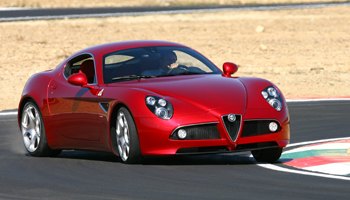
|
The first Alfa Romeo sports car in
nearly 20 years. Welcome back to the sports car world !
|
This
is the first Alfa Romeo sports car since the 1989 SZ and RZ. For nearly
20 years, people have been forgetting that Alfa Romeo used to be a
famed sports and racing cars manufacturer. Do you still remember the 6C
and 8C series ?
The race-winning TZ1
and TZ2 ? The V8-engined Montreal
? The
exotic Tipo 33
Stradale ? While older car lovers still remember its sports car
pedigree, younger people only see Alfa as a semi-premium brand that
uses a lot of Fiat mechanicals and always trails behind BMW. In order
to revive its image, the Italian car maker bravely decided to build the
8C Competizione supercar, even though it is totally irrelevant to the
rest of the range. Priced at £112,000, the 8C sits lonely at the
top of the range. Only a limited run of 500 cars will be built (with
another 500 Spiders to follow). All sold out already. This must be the
most desirable Alfa Romeo sports car since Tipo 33.
Such success is contributed by two names: Wolfgang Egger and Maserati.
Wolfgang Egger was the design chief of Alfa Romeo before he jumped to
Audi this year. 8C Competizione was his last design for Alfa and,
undoubtedly, the most beautiful design as well. It combines a classical
sports car theme with sexy curves and some links with the past models
(e.g. the 3-element grille is clearly inspired by TZ1). When it was
unveiled to the public in 2003 Frankfurt motor show, people loved it
immediately. It looks compact, sporty and gorgeous. It is a design that
everybody will turn head when encountering it on the street, staring it
until it disappears in corner. The visual impact is greater than any
other front-engined sports cars on the earth, including Maserati
GranTurismo, Aston DB9, V8 Vantage and Ferrari 599GTB. The top
management of Fiat approved its production in 2005.
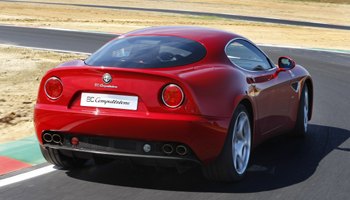
|
Sexy, compact and retro, the 8C
Competizione looks like a modern version of the finest 1960s sports car.
|
Then the
question
was how to realize it. Alfa does not have a suitable rear-drive
platform, but its sister company Maserati has - the one underpinning
Quattroporte and GranTurismo. The production 8C Competizione is
therefore built on a shortened Maserati floorpan, with 300 mm cut from
the wheelbase compare with GranTurismo as it is a 2-seater. The
excellent Maserati transaxle with rear-mounted 6-speed Cambio Corsa
semi-automatic gearbox and ZF limited slip differential return a
perfect weight distribution of 49:51. The double-wishbone suspensions
are kept but with sportier tuning and adaptive damping deleted. All
these are packaged in an exotic carbon-fiber bodyshell, which saves 80
kilograms, lowers the center of gravity and justifies the
£112,000 price.
The whole car is built in Maserati's Modena plant, but the engine comes
from Maranello - in fact, the engines of Maserati are also built by
Ferrari. This is the next generation Maserati V8. Still features
all-aluminum construction and intake variable valve timing, but 2 mm
larger bore and 4.7 mm longer stroke increases it capacity from 4244cc
to 4691cc. Moreover, compression ratio is raised from 11.0 to 11.3:1.
It produces 450 horsepower (up from 405) and 354 lb-ft of torque (up
from 339). These figures are not exactly a match to BMW M6, but the
Alfa Romeo is lighter at 1585 kilograms. Road & Track magazine
proved that it is capable to accelerate from 0-60 mph in 4.2 seconds
and 0-100 mph in 9.3 seconds. Top speed is claimed to be 182 mph,
although Alfa Romeo clocked 186 mph at Nardo test track. The 8C
Competizione offers comparable performance to Porsche 911 GT3.
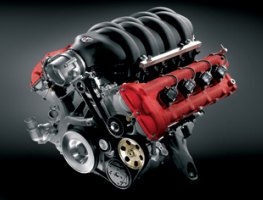
|
It's not one of the members of the 500
hp Club, but so what ? Few engines could match the inspiration it
brings.
|
Open the door,
you
will be excited by the style and quality of its interior. There is none
of the traces of poor finish normally associated with a limited edition
car. Instead, everything is solidly assembled and most surfaces are
covered by carbon-fiber, aluminum or Italian leather. Behind the
delicious carbon-fiber & leather bucket seats are a couple of
custom-made leather bags. The whole cabin delivers a sense of occasion
only found in the most exotic Italian supercars. The view out is
equally exotic, thanks to the pronounced flanks.
Fire the engine and the desirability continues. Squeeze rev from the
wonderful Italian V8, what a sound ! Its note changes throughout the
rev range, from the bark and rumble at bottom end rises to the F1 howl
at top end. Press the Sport button and the exhaust notes gets
intensified by the opening of bypass valves. The addictive soundtrack,
the instantaneous throttle response and the free-revving manner put
smile on your face. This engine is plenty tractable from 2000 rpm, but
its true color is not revealed until 4000 rpm, where it gets explosive
all the way to the 7500 rpm cut-out. It tempts you to squeeze more rev
from it and rewards you with power and sound. Undoubtedly, this is one
of the most inspiring engines in the world.
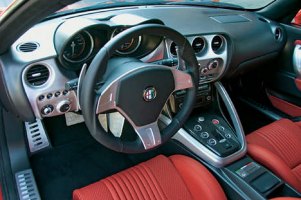
|
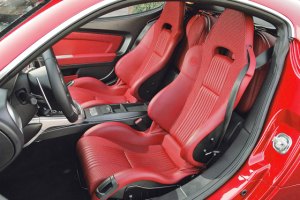 |
Cockpit is another highlight of the
car - stylish, high-quality and bespoke.
|
The
paddle-shift
gearbox is reasonably good but not in the same league as the engine,
simply because it does not shift as fast as the recent Ferraris (599GTB
and 430 Scuderia in particular). In contrast, the mighty disc brakes
(360 mm diameter front and 330 mm rear) provide astonishing stopping
power.
The handling is generally brilliant if you leave its traction control
on and in Sport mode. It produces excellent grip, remarkable balance
and feels very nimble in corners - just like how its compact dimensions
suggest. The 2.5-turn steering rack is quick and precise, if not as
communicative as an Italian supercar should be, though it is still
better than the new BMW M3.
With traction control off, the handling gets a little tricky at the
limit - some mild initial undesteer followed by oversteer. If you are
Schumacher, Raikkonen or Alonso, you will probably enjoy power sliding
it because it is one of the easiest front-engined cars today to do so.
But this requires very accurate application of throttle and steering
correction. If you don't have superior driving skill, then you had
better to leave the traction control on.
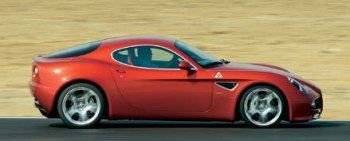
|
Frankly, handling & ride is a
little disappointing base on the Maserati system, but no car is perfect.
|
One thing is
for
sure: the 8C is not a cross-continental grand tourer like Maserati. Its
suspension tuning is very stiff and therefore you can imagine how harsh
it rides on regular roads. You may see it as a hot-rod GT, or more
appropriately, a front-engined version of Porsche GT3. Yes, it cannot
match the Porsche for tactile handling or lap time, but neither can the
Porsche match its engine, its beauty and its special feel. So after
waiting for 2 decades, we are glad to see Alfa Romeo back to the sports
cars business in style. Long-time car enthusiasts can't help saying: Viva, Alfa ! Viva,
Maserati !
|
| The
above report was last updated on 25 Dec 2007. All Rights Reserved. |
|
8C Spider
|
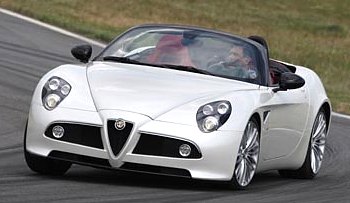
|
Each Spider is priced at a staggering
£174,000, or 55 percent dearer than the Coupe.
|
Alfa
Romeo originally
planned to
build 500 units of 8C Competizione. However, the car was met with
overwhelming demand. Therefore it decided to produce another 500 units
of Spider right after the production run of Coupe completed. As plenty
of customers are willing to pay premium to secure one of them, each
Spider is priced at a staggering £174,000, or 55 percent dearer
than the Coupe.
Conversion from coupe to roadster is quite straightforward. The
carbon-fiber bodywork is largely unaltered except that the hard roof is
replaced with a 2-layer fabric soft top. Its operation is electric
powered, but you need to unlatch it from the windscreen header first.
To compensate for the loss of rigidity, the windscreen header is now
made of a solid piece of carbon-fiber, the front suspensions are
reinforced by a cross brace over their top mounts, the sills and
floorpan of its tubular steel chassis are also strengthened. Thanks to
the adoption of Brembo ceramic brakes as standard (which are 14 kg
lighter than steel ones), the whole car is just 90 kg heavier than the
Coupe.
Predictably, the marvelous 450hp Ferrari-Maserati V8 and 6-speed
automated manual transaxle are both unchanged. Alfa Romeo claims it
loses only 0.1 second to the Coupe in 0-60 mph acceleration. Top speed
is the same 182 mph.
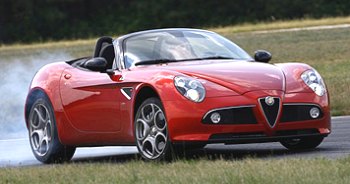
|
The main reason for this car to open
its roof is to get the full aural excitement of one of the world's best
sounding engines...
|
The suspensions of Spider has been retuned to reflect its slightly
reduced chassis rigidity as well as the lighter unsprung weight
resulting from ceramic discs. Springs and anti-roll bars are stiffer,
but dampers are softer than the Coupe. On the road, its ride quality is
actually slightly improved, although it is still on the hardcore side
compared with a 911 Turbo or Ferrari California. The character of its
handling is similar to the Coupe. Push it into a corner, it understeers
a bit initially, but then you can balance its attitude with throttle
and swing its tail out quite dramatically. It has the pros and cons of
classic sports cars.
Rough edges include the heavy but uncommunicative steering, the lack of
pedal feel from the ceramic brakes and the paddle-shift transmission,
whose speed and smoothness lag behind modern twin-clutch boxes.
However, you can forgive all these flaws once you hear the V8 screaming
towards 7500 rpm. The main reason for this car to open its roof is not
to let you enjoy sunshine and fresh air, but to get the full aural
excitement of one of the world's best sounding engines.
Purchasing the 8C Spider is an emotional choice. Ignoring its sound,
its looks or its rarity, you can easily conclude that Ferrari
California, 599GTB or Aston Martin V12 Vantage are better choices. But
Alfa Romeo has already found 500 emotional customers. If you are too
late to make your mind, you can only pray for another limited edition
after the production run of Spider finished in December 2010.
|
| The
above report was last updated on 19 Jul 2009. All Rights Reserved. |
|
|










